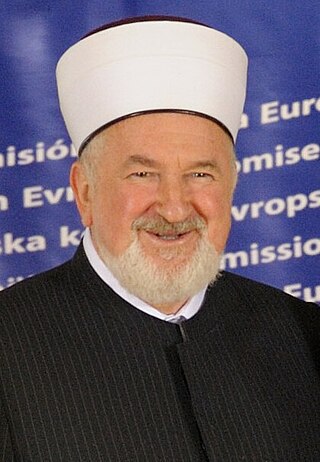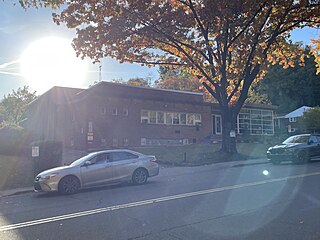
Interfaith dialogue, also known as interreligious dialogue, refers to cooperative, constructive, and positive interaction between people of different religious traditions and/or spiritual or humanistic beliefs, at both the individual and institutional levels.

The documented history of Islam in the Republic of Ireland dates back to the 1950s. The number of Muslims in the Republic of Ireland has increased since the 1990s, mostly through immigration. For the 2022 Irish census, 81,930 were counted.
Sheikh Mohammed Aboulkhair Zaki Badawi, KBE, GCFO was a prominent Egyptian Islamic scholar, community activist, and promoter of interfaith-dialogue. He was the principal of the Muslim College in London, which he founded in 1986. He also was a frequent writer and broadcaster on Islamic affairs.

Mustafa ef. Cerić is a Bosnian imam who served as the Grand Mufti of Bosnia and Herzegovina from 1993 to 2012, and is currently president of the World Bosniak Congress. In the 2014 general election, he ran for a seat in the Presidency of Bosnia and Herzegovina as a Bosniak member, but was not elected.

Zaid Shakir is an American Muslim scholar and co-founder of Zaytuna College in Berkeley, California. He teaches courses on Arabic, law, history, and Islamic spirituality.

Kobe Mosque, also known as Kobe Muslim Masjid, was founded in October 1935 in Kobe and is Japan's first mosque. It is situated in the Hyōgo Prefecture city of Kobe. Established in October 1935, it holds historical significance as a symbol of the early presence of Islam in Japan. Its construction was funded by donations collected by the Islamic Committee of Kobe from 1928 until its opening in 1935. The mosque was confiscated by the Imperial Japanese Navy in 1943, survived airaids in n 1945, and withstood the Great Hanshin earthquake of 1995. It is located in the Kitano-cho foreign district of Kobe, one of the city's best-known tourist areas which features many old western style buildings.
The Global Peace and Unity is a recurring two-day event/festival and conference held at the ExCeL Exhibition Centre in Royal Victoria Dock, London, England and organized by the Islam Channel. It is the largest Muslim, interfaith and multicultural event of its kind in Europe. There have been six conferences since its inception. The first was on 4 December 2005, with others in 2006, 2007, 2008, 2010 and 2013. The 2006 event attracted over 55,000 visitors from five continents. The conference includes an Islamic exhibition, an evening nasheed concert, as well as a series of talks, workshops, seminars and lectures from international speakers over two days.

The Al-Manar Centre is a Sunni Mosque and community hub located in the Cathays district of Cardiff, Wales. Established in 1992, the centre follows the principles of Ahlus-Sunnah wal-Jamaa'ah and serves as a key institution for religious, educational, and social engagement within the local community.

Abdullah Nooruddeen Durkee was a Muslim scholar, thinker, author, translator, and the Khalifah (successor) for North America of the Shadhdhuli School for Tranquility of Being and the Illumination of Hearts, Green Mountain Branch. Nooruddeen Durkee became a Muslim in his early thirties in Al-Quds, Jerusalem. He was one of the co-founders of Lama Foundation and founder of Dar al-Islam Foundation.

The Al Mahdi Mosque is an Ahmadi Muslim mosque in Bradford, England. The mosque was built at a cost £2.5 million entirely from voluntary donations of British Ahmadi Muslims. The mosque was opened on 7 November 2008 by Mirza Masroor Ahmad, the current and fifth caliph of Ahmadiyya Muslim Community. With a capacity of 2,000 worshippers, it is among the largest in the city. The inauguration was attended by many Ahmadi Muslims and over 300 guests. The mosque, on Rees Way, was built at the top of a hill and is visible from miles around within the city.

The Khalili Foundation is a UK-based charity promoting interfaith and intercultural understanding through art, culture and education. Its founder and chairman is the London-based philanthropist, art collector and scholar Sir David Khalili. A Persian Jew who grew up in Iran, he is notable for having the world's largest private collection of Islamic art. Established in 1995, the foundation has created interfaith and intercultural links through "cultural, academic, sporting and educational programmes".
Project Interfaith, based in Omaha, Nebraska, is a nonprofit organization [501(c)(3)]. Founded in 2004 by Executive Director Beth Katz, Project Interfaith aims to create a sustainable interfaith program. Through donor support, Project Interfaith was formally launched in December 2005. Project Interfaith has since formally incorporated and received tax-exempt status. Project Interfaith started a multimedia video website, RavelUnravel on May 17, 2012 which explores spiritual and religious identities that make up the world. Project Interfaith closed its doors in February 2015.

Ismail Raji al-Faruqi was a Palestinian-American Muslim philosopher who worked in Islamic studies and interfaith dialogue. He spent several years at Al-Azhar University in Cairo and taught at universities in North America, including McGill University in Montreal, Canada. Al-Faruqi was a professor of religion at Temple University, where he founded and chaired the Islamic Studies program. He also founded the International Institute of Islamic Thought (IIIT). Al-Faruqi authored over 100 articles and 25 books, including Christian Ethics: A Historical and Systematic Analysis of Its Dominant Ideas (1967) and Al-Tawhid: Its Implications for Thought and Life (1982).
The Al-Mustafa Islamic Cultural Centre Ireland, which started its activities as Clonee Mosque, based in the village of Clonee, is the mainstream and leading Islamic Centre in Dublin 15, Ireland. It was established in January 2004 as Clonee Mosque, to act as a place of worship for the Muslim community in Clonee and surrounding areas of Dublin 15.

Khalifa Ezzat was born in upper Egypt where he first received his Islamic education in the Al Azhar Institute. Khalifa completed the memorisation of the Qur'an, at early age. As part of, his prep and secondary school at Al-Azhar in Al Fashn; his early academic life, predominately composed of learning major traditional Islamic doctrines, including, Tafsir, Hadith, Arabic language, Shariah/Fiqh, and Theology. After successfully completing his secondary education, he was nominated and enrolled in Al Azhar University in Cairo to complete his Islamic education.

Muhammad bin Abdul Karim Issa is a Saudi Arabian religious leader, Secretary General of the Muslim World League, President of the International Islamic Halal Organization, and former Saudi Minister of Justice.

Sayyid Ibraheem Khaleel Al Bukhari is founder and chairman of Ma'din Academy and adviser of World Interfaith Harmony Week. He is a sunni Islamic scholar, Joint Secretary of Samastha Kerala Jamiyyathul Ulama, General Secretary of Kerala Muslim Jamaat, a body of various Muslim organizations in Kerala and he is listed in The Muslim 500.
The InterFaith Leadership Council of Metropolitan Detroit is a faith-based civic organization founded in 2010 by members of a Detroit-based interfaith group known then as the Interfaith Partners. Its headquarters are in Oak Park, Michigan.

The Islamic Center of Pittsburgh is an Islamic educational, social services, and community outreach organization in the Oakland neighborhood of Pittsburgh, Pennsylvania. Founded in 1989, it is the largest mosque in the city, attracting 600 to 700 participants for weekly prayers. It provides social services for people of all religious backgrounds and engages in educational outreach and interfaith dialogue to foster community understanding and cooperation.

The Bradford Grand Mosque, or Al-Jamia Suffa-Tul-Islam Grand Mosque, is the largest mosque by capacity in the United Kingdom. It is located Bradford, West Yorkshire, England.














